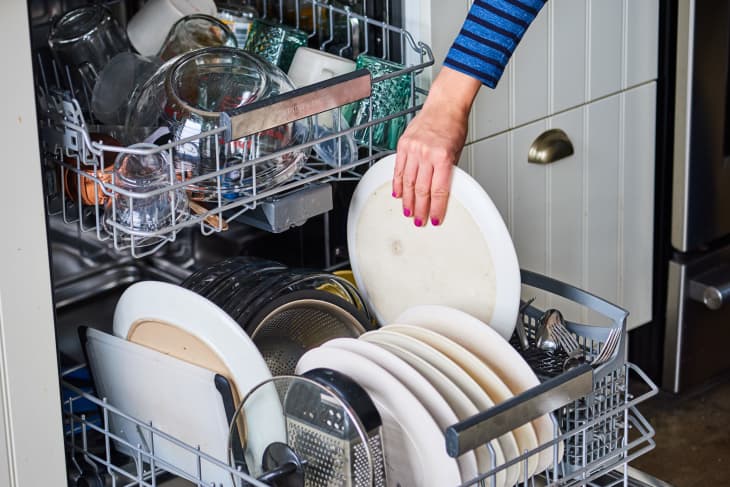7 Things You Didn’t Know About Dishwasher Detergent
There’s nothing in the kitchen families love to fight about more than dishwashers. Usually, though, it’s about the right (versus the wrong) way to load the appliance. We have lots to say about that, too, but right now, we’re here to talk about your dishwasher detergent. Whether you use the liquid stuff, a powder, those chalky tablets, or the gel pods, there are a few things you should know — things that, quite frankly, aren’t up for debate.
Ready to learn? Here seven things you probably didn’t know about dishwasher detergent.
1. Detergent works better if you don’t rinse your dishes.
It’s important to scrape larger scraps of food off your dishes. (Leaving large scraps on your plate will clog the dishwasher’s filter and can also lead to odors.) But don’t make the mistake of rinsing your dishes completely clean, thinking that doing so will help your dishwasher work better. The opposite is actually true. Dishwashers have sensors that detect how dirty your dishes are, so if it detects that your dishes are mostly clean, it won’t work as hard as you expect it to. In addition (and here’s where the detergent part comes in), the detergents themselves attach to the food particles in order to do their job. Pre-rinsing compromises the power of your detergent and could end up leaving you with still-dirty dishes.
2. You’re probably using too much detergent.
Adding a little bit of extra detergent seems like it can only be a good thing, but add too much detergent and your dishes are likely to come out, well, not great. If you notice your dishes coming out of the dishwasher with a film, too much detergent is very likely the culprit. While closely following the instructions on your liquid or gel detergent’s bottle can help alleviate the issue, Faith describes her own dishwasher detergent journey and how starting with even less than the recommended amount has worked for her family. Another thing to keep in mind: Pods are convenient, to be sure, but you can’t use less detergent with pods. Liquid or gel detergents are worth considering if you’re struggling with that lingering film. For what it’s worth: Kitchn’s favorite detergent is a powder (this powder, to be specific).
3. You might need a detergent that’s formulated for hard water.
If you have hard water where you live, even if you’re using detergent correctly, you could still end up with cloudy dishes. If this is happening to you, try switching to a detergent formulated for hard water. You might even want to try a rinse aid.
4. A rinse aid is more important than you think.
If you’re not exactly sure what a rinse aid does, you might be quick to decide that you don’t need one. But actually, using a rinse aid can help you get cleaner and drier dishes once the dishwashing cycle is finished. Ever since detergents had to be reformulated without phosphates, rinse aids are even more necessary than they were a decade or so ago. You can read, in depth, about what’s in rinse aids and how they work on Wirecutter, but, in a nutshell, the surfactants in rinse aids break the surface tension of the water so it can evaporate more quickly. This also prevents water spots. Rinse aids also help prevent food from getting redeposited onto your dishes.
5. Detergent pods still need to go in the dish detergent compartment.
Detergent pods are mess-free, convenient, and, honestly, kind of fun. But they still need to get put into the liquid detergent compartment of your dishwasher, not just tossed into the bottom of your unit. The reason is that the pod will begin to dissolve right away when water hits it. Putting it in the main wash compartment ensures that the detergent is introduced at the right point in the cycle so it can work its best.
6. Dishwasher tablets can be used to clean lots of other things.
Turns out, those chalky dishwasher tablets are useful beyond the dishwasher too. We’ve tried (and loved!) using them to clean our oven doors, our toilet bowls, and more. We’ve even used the gel packs to clean baking sheets (because TikTok told us to)!
7. You can make your own dishwasher detergent in a pinch.
If you’re in a pinch and find yourself with a full dishwasher and an empty container of detergent, you can make your own. Simply mix 1/2 cup of baking soda and 1/2 cup of borax in an airtight container. Then scoop out one to two tablespoons into your dishwasher’s soap container and run the cycle as normal, says Leanne Stapf, chief operating officer of The Cleaning Authority.
Do you have any lingering questions about dishwasher detergent? Leave them in the comments below and we’ll try to answer them!
